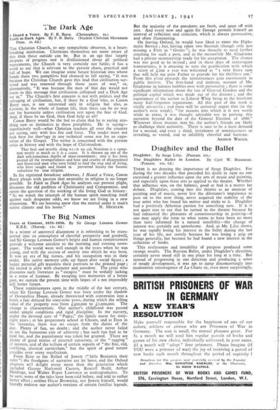The Big Names
Years of Content, 1858-1886. By Sir George Leveson Gower' K.B.E. (Murray. I2S. 6d.) IN a winter of universal discontent it is refreshing to be trans- ported into an atmosphere of cheerful prosperity and goodwill, and Sir George Leveson Gower's bright and human reminiscences provide a welcome antidote to the morning and evening news- paper. The world went well enough in the years when he was young, and with the section of society into which he was born. It was an era of big names, and his occupation was in their midst. His active memory Calls up figure after social figure ; a happy pictorial gift transfers their portraits to the printed page ; the record is alive with character and anecdote. The cynic who discounts such literature as " escapist " must be wofully lacking in a sense of humour. By escaping into memories of a better past, we sustain the present time with hopes of a not impossibly still better future.
These reminiscences open in the middle of the last century, when Sir George Leveson Gower was born under the shadow of Devonshire House, already threatened with conversion into a hotel, a fate delayed for sixty-nine years, during which the selling value of the property rose from £400,000 to £I,000,000. The change is characteristic. Our author's childhood was passed under simple conditions and rigid discipline. In the nursery, under the devoted care of " Pagey," the family nurse for sixty- eight years ; at his preparatory school at Cheam, and at Eton in the 'seventies, there was no escape from the duties of the day. Plenty of fun, no doubt ; and the author never failed to see the humorous side of adversity ; but such fun had to be paid for, and the punishment was taken for granted. There are plenty of good stories of paternal autocracy, of the " ragging " of masters, and of the tedium of certain aspects of " the fine, old, fortifying, classical curriculum," but the spirit of good nature presides over every recollection. From Eton to the Balliol of Jowett (" little Benjamin their ruler ") the floodgates of narrative are let loose, and the Oxford chapters will delight many more than the generation which included George Nathaniel Curzon, Rennell Rodd, Arthur Hardinge, and Walter Roper Lawrence as undergraduates. To be sure, some of the tales have been told before, and told to rather better effect ; neither Oscar Browning, nor Jowett himself, would literally endorse our author's versions of certain familiar legends. But the majority of the anecdotes arc fresh, and spun off with zest. And every now and again Sir George permits himself an interval of reflection and criticism, which is always provocative, and often illuminating.
On leaving Oxford, he would have liked to enter the Diplo- matic Service ; but, having taken two Seconds (though only just missing a First in "Greats "), he was thought to need further coaching for such a post, and in the meanwhile Mr. Gladstone had a private secretaryship ready for his acceptance. The chance was too good to be missed ; and in these days of extravagant honorariums, it is amusing to note the gratification with which a salary of £200 a year was welcomed as " a very brave sum that will help my poor Father to provide for his thriftless son." From this point onwards the reminiscences gain enormously in public interest. The first-hand and intimate account of Mr. Gladstone iq harness bubbles over with personality ; there is some significant information about the fate of General Gordon and the political capital which was made out of the disaster ; and the experiences of the author as Liberal Whip bring to the forefront many half-forgotten reputations. All this part of the book is vitally attractive ; and there will be universal regret that (in the author's own words), " for reasons into which it is not worth while to enter, it was thought advisable not to prolong this narrative beyond the date of the General Election of 1886." Whatever those reasons may be, the author's friends are likely to challenge their authority. There is sure to be a keen demand for a second, and even a third, instalment of reminiscences so revealing, so varied, and so infallibly cheerful and humane.
ARTHUR WAUGH.






























 Previous page
Previous page